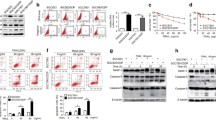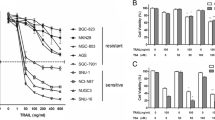Abstract
Objective: Tumor necrosis factor-related apoptosis-inducing ligand (TRAIL) is thought to be a promising anti-neoplastic agent because of its ability to selectively induce apoptosis in cancer cells. However, some cancer cells are resistant to TRAIL. The mechanisms underlying this resistance are unclear. The aim of this study was to explore the role of programmed cell death 4 (PDCD4) in regulating TRAIL sensitivity in gastric cancer cells.
Methods: PDCD4 complementary DNA and PDCD4-specific short-hairpin RNA (shRNA) fragments were transfected into TRAIL-sensitive and -resistant gastric cancer cells. Expression of PDCD4 and Akt was detected via western blot. Cell survival and apoptosis were measured using 3-(4,5-dimethylthiazolyl)-2,5-diphenyltetrazolium bromide (MTT) and flow cytometry (FCM) assays.
Results: We found that upregulation of PDCD4 enhanced TRAIL sensitivity in gastric cancer cells. Downregulation of PDCD4 decreased TRAIL sensitivity. Inhibition of Akt by the phosphoinositide 3-kinase (PI3K) inhibitor LY294002 induced PDCD4 activity and enhanced TRAIL sensitivity in TRAIL-resistant gastric cancer cells.
Conclusion: We demonstrated that PDCD4 regulates TRAIL sensitivity in gastric cancer cells by inhibiting the PI3K/Akt signaling pathway.




Similar content being viewed by others
References
Yagita H, Takeda K, Hayakawa Y, et al. TRAIL and its receptors as targets for cancer therapy. Cancer Sci 2004; 95: 777–83
Kruyt FA. TRAIL and cancer therapy. Cancer Lett 2008; 263: 14–25
Ozoren N, El-Deiry WS. Cell surface death receptor signaling in normal and cancer cells. Semin Cancer Biol 2003; 13: 135–47
Panner A, Parsa AT, Pieper RO. Translational regulation of TRAIL sensitivity. Cell Cycle 2006; 5: 147–50
Ashkenazi A, Pai RC, Fong S, et al. Safety and antitumor activity of recombinant soluble Apo2 ligand. J Clin Invest 1999; 104: 155–62
Griffith TS, Lynch DH. TRAIL: a molecule with multiple receptors and control mechanisms. Curr Opin Immunol 1998; 10: 559–63
Jansen AP, Camalier CE, Colburn NH. Epidermal expression of the translation inhibitor programmed cell death 4 suppresses tumorigenesis. Cancer Res 2005; 65: 6034–41
Hilliard A, Hilliard B, Zheng SJ, et al. Translational regulation of autoimmune inflammation and lymphoma genesis by programmed cell death 4. J Immunol 2006; 177: 8095–102
Yang HS, Matthews CP, Clair T, et al. Tumorigenesis suppressor Pdcd4 down-regulates mitogen-activated protein kinase kinase kinase kinase 1 expression to suppress colon carcinoma cell invasion. Mol Cell Biol 2006; 26: 1297–306
Cmarik JL, Min H, Hegamyer G, et al. Differentially expressed protein Pdcd4 inhibits tumor promoter-induced neoplastic transformation. Proc Natl Acad Sci U S A 1999; 96: 14037–42
Yang HS, Jansen AP, Nair R, et al. A novel transformation suppressor, Pdcd4, inhibits AP-1 transactivation but not NF-kappaB or ODC transactivation. Oncogene 2001; 20: 669–76
Yang HS, Knies JL, Stark C, et al. Pdcd4 suppresses tumor phenotype in JB6 cells by inhibiting AP-1 transactivation. Oncogene 2003; 22: 3712–20
Goke R, Barth P, Schmidt A, et al. Programmed cell death protein 4 suppresses CDK1/cdc2 via induction of p21(Waf1/Cip1). Am J Physiol Cell Physiol 2004; 287: C1541–6
Gao F, Zhang P, Zhou C, et al. Frequent loss of PDCD4 expression in human glioma: possible role in the tumorigenesis of glioma. Oncol Rep 2007; 17: 123–8
Zhang H, Ozaki I, Mizuta T, et al. Involvement of programmed cell death 4 in transforming growth factor-beta1-induced apoptosis in human hepatocellular carcinoma. Oncogene 2006; 25: 6101–12
Chen Y, Knosel T, Kristiansen G, et al. Loss of PDCD4 expression in human lung cancer correlates with tumour progression and prognosis. J Pathol 2003; 200: 640–6
Lankat-Buttgereit B, Gregel C, Knolle A, et al. Pdcd4 inhibits growth of tumor cells by suppression of carbonic anhydrase type II. Mol Cell Endocrinol 2004; 214: 149–53
Jin H, Kim TH, Hwang SK, et al. Aerosol delivery of urocanic acid-modified chitosan/programmed cell death 4 complex regulated apoptosis, cell cycle, and angiogenesis in lungs of K-ras null mice. Mol Cancer Ther 2006; 5: 1041–9
Jansen AP, Camalier CE, Stark C, et al. Characterization of programmed cell death 4 in multiple human cancers reveals a novel enhancer of drug sensitivity. Mol Cancer Ther 2004; 3: 103–10
Chen X, Thakkar H, Tyan F, et al. Constitutively active Akt is an important regulator of TRAIL sensitivity in prostate cancer. Oncogene 2001; 20: 6073–83
Thakkar H, Chen X, Tyan F, et al. Pro-survival function of Akt/protein kinase B in prostate cancer cells: relationship with TRAIL resistance. J Biol Chem 2001; 276: 38361–9
Lane D, Robert V, Grondin R, et al. Malignant ascites protect against TRAIL-induced apoptosis by activating the PI3K/Akt pathway in human ovarian carcinoma cells. Int J Cancer 2007; 121: 1227–37
Bellacosa A, Chan TO, Ahmed NN, et al. Akt activation by growth factors is a multiple-step process: the role of the PH domain. Oncogene 1998; 17: 313–25
Chan TO, Rittenhouse SE, Tsichlis PN. AKT/PKB and other D3 phosphoinositide-regulated kinases: kinase activation by phosphoinositide-dependent phosphorylation. Annu Rev Biochem 1999; 68: 965–1014
Palamarchuk A, Efanov A, Maximov V, et al. Akt phosphorylates and regulates Pdcd4 tumor suppressor protein. Cancer Res 2005; 65: 11282–6
Luo J, Manning BD, Cantley LC. Targeting the PI3K-Akt pathway in human cancer: rationale and promise. Cancer Cell 2003; 4: 257–62
Testa JR, Bellacosa A. AKT plays a central role in tumorigenesis. Proc Natl Acad Sci U S A 2001; 98: 10983–5
Nicholson KM, Anderson NG. The protein kinase B/Akt signalling pathway in human malignancy. Cell Signal 2002; 14: 381–95
Vivanco I, Sawyers CL. The phosphatidylinositol 3-kinase AKT pathway in human cancer. Nat Rev Cancer 2002; 2: 489–501
Yan W, Fu Y, Tian D, et al. PI3 kinase/Akt signaling mediates epithelial-mesenchymal transition in hypoxic hepatocellular carcinoma cells. Biochem Biophys Res Commun 2009; 382: 631–6
Capodanno A, Camerini A, Orlandini C, et al. Dysregulated PI3K/Akt/PTEN pathway is a marker of a short disease-free survival in node-negative breast carcinoma. Hum Pathol 2009; 40: 1408–17
Olson A, Sheth N, Lee JS, et al. RNAi Codex: a portal/database for short-hairpin RNA (shRNA) gene-silencing constructs. Nucleic Acids Res 2006; 34: D153–7
Nagane M, Pan G, Weddle JJ, et al. Increased death receptor 5 expression by chemotherapeutic agents in human gliomas causes synergistic cytotoxicity with tumor necrosis factor-related apoptosis-inducing ligand in vitro and in vivo. Cancer Res 2000; 60: 847–3
Kim K, Fisher MJ, Xu SQ, et al. Molecular determinants of response to TRAIL in killing of normal and cancer cells. Clin Cancer Res 2000; 6: 335–46
Chinnaiyan AM, Prasad U, Shankar S, et al. Combined effect of tumor necrosis factor-related apoptosis-inducing ligand and ionizing radiation in breast cancer therapy. Proc Natl Acad Sci U S A 2000; 97: 1754–9
Kim K, Takimoto R, Dicker DT, et al. Enhanced TRAIL sensitivity by p53 overexpression in human cancer but not normal cell lines. Int J Oncol 2001; 18: 241–7
Oki E, Baba H, Tokunaga E, et al. Akt phosphorylation associates with LOH of PTEN and leads to chemoresistance for gastric cancer. Int J Cancer 2005; 117: 376–80
Kobayashi I, Semba S, Matsuda Y, et al. Significance of Akt phosphorylation on tumor growth and vascular endothelial growth factor expression in human gastric carcinoma. Pathobiology 2006; 73: 8–17
Lin HL, Yang MH, Wu CW, et al. 2-Methoxyestradiol attenuates phosphatidylinositol 3-kinase/Akt pathway-mediated metastasis of gastric cancer. Int J Cancer 2007; 121: 2547–55
Ang KL, Shi DL, Keong WW, et al. Upregulated Akt signaling adjacent to gastric cancers: implications for screening and chemoprevention. Cancer Lett 2005; 225: 53–9
Cantley LC. The phosphoinositide 3-kinase pathway. Science 2002; 296: 1655–7
Dorrello NV, Peschiaroli A, Guardavaccaro D, et al. S6K1-and betaTRCP-mediated degradation of PDCD4 promotes protein translation and cell growth. Science 2006; 314: 467–71
Schmid T, Jansen AP, Baker AR, et al. Translation inhibitor Pdcd4 is targeted for degradation during tumor promotion. Cancer Res 2008; 68: 1254–60
Ozpolat B, Akar U, Steiner M, et al. Programmed cell death-4 tumor suppressor protein contributes to retinoic acid-induced terminal granulocytic differentiation of human myeloid leukemia cells. Mol Cancer Res 2007; 5: 95–108
Carayol N, Katsoulidis E, Sassano A, et al. Suppression of programmed cell death 4 (PDCD4) protein expression by BCR-ABL-regulated engagement of the mTOR/p70 S6 kinase pathway. J Biol Chem 2008; 283: 8601–10
Lankat-Buttgereit B, Muller S, Schmidt H, et al. Knockdown of Pdcd4 results in induction of proprotein convertase 1/3 and potent secretion of chromogranin A and secretogranin II in a neuroendocrine cell line. Biol Cell 2008; 100: 703–15
Woodard J, Sassano A, Hay N, et al. Statin-dependent suppression of the Akt/mammalian target of rapamycin signaling cascade and programmed cell death 4 up-regulation in renal cell carcinoma. Clin Cancer Res 2008; 14: 4640–9
Mudduluru G, Medved F, Grobholz R, et al. Loss of programmed cell death 4 expression marks adenoma-carcinoma transition, correlates inversely with phosphorylated protein kinase B, and is an independent prognostic factor in resected colorectal cancer. Cancer 2007; 110: 1697–707
Li D, Qu X, Hou K, et al. PI3K/Akt is involved in bufalin-induced apoptosis in gastric cancer cells. Anticancer Drugs 2009; 20: 59–64
Acknowledgments
Wei-Qiang Wang and Hao Zhang contributed equally to this work. The work was financially supported by the Scientific Research Foundation of the Chinese People’s Liberation Army, during the 10th Five-Year Plan Period, No. 01MA172.
The authors have no conflicts of interest that are directly relevant to the content of this study.
Author information
Authors and Affiliations
Corresponding author
Rights and permissions
About this article
Cite this article
Wang, WQ., Zhang, H., Wang, HB. et al. Programmed Cell Death 4 (PDCD4) Enhances the Sensitivity of Gastric Cancer Cells to TRAIL-Induced Apoptosis by Inhibiting the PI3K/Akt Signaling Pathway. Mol Diag Ther 14, 155–161 (2010). https://doi.org/10.1007/BF03256368
Published:
Issue Date:
DOI: https://doi.org/10.1007/BF03256368




